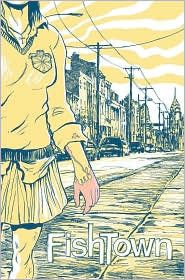Kevin Colden has been a presence in the webcomics world for years, producing work for online collectives like "The Chemistry Set" and "ACT-I-VATE." But here he is with his first hardcover book, a collected edition of his serialized webcomic "Fishtown." And it's one of the most impressive books of the year.
"Fishtown" tells the ripped-from-the-headlines story of the brutal murder of a Philadelphia teenager, told in an elliptical, non-linear fashion. It's not a mystery story, or a detective drama. We know who did it almost right away, although as the story unfolds we learn more about whom they did it to, if not why. But the why is the big question, as "Fishtown" becomes a series of confessionals, flashbacks, and discussions that ultimately explore the nature of evil.
It's not the kind of evil of the costumed supervillain variety, or of the shlocky pulp moustache-twisters. No, it's the kind of evil that comes when three teenage boys unleash their sociopathic tendencies on an innocent young man. It's the kind of evil that percolates slowly from a real-life situation gone wrong. It's the kind of evil that's so inexplicable, so horrifying, that the more we learn about the motivations of the characters, the more we realize how little we know the people around us.
Colden ultimately reveals the details of the crime, and shows the aftermath, but he leaves it to the reader to interpret what it says about humanity. He offers no simplistic moral lessons here, but instead provides a poetic exploration of a gruesome event. He certainly never glorifies the murder at the story's center, but he offers no caption boxes telling us how we should feel about the terrible crime. He lets the images, and the oblique dialogue, speak for themselves.
Stylistically, Colden brings an interesting approach to "Fishtown." Not only does he juxtapose confessional direct address sequences with flashbacks and insert shots, but he uses a limited color palate to great effect. Restricting himself to deep blues, pale yellows, and washed-out pinks, he gives the story a sickly feel, creating a kind of poisonous environment in which his junior monstrosities fester and brood. The heavy reliance on yellow makes the pages look a bit faded on first glance, but that effect adds to the hazy distance through which we view the lives of these characters. And when the climactic moment occurs, Colden dramatically increases the sense of immediacy, turning a poetic reflection on evil into a look at a sickeningly specific deed.
IDW has a lot of handsome books on the stands these days, but this one stands apart. "Fishtown" doesn't look like anything else, and its story will haunt you long after you close the covers.

